|
|
|
Sort Order |
|
|
|
Items / Page
|
|
|
|
|
|
|
| Srl | Item |
| 1 |
ID:
048999
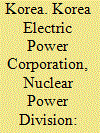

|
|
|
|
|
| Publication |
Seoul, Nuclear Power Generation Department, 1996.
|
| Description |
33p.
|
|
|
|
|
|
|
|
|
|
|
|
Copies: C:1/I:0,R:0,Q:0
Circulation
| Accession# | Call# | Current Location | Status | Policy | Location |
| 039546 | 355.825119/NUC 039546 | Main | On Shelf | General | |
|
|
|
|
| 2 |
ID:
118339
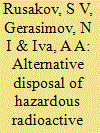

|
|
|
|
|
| Publication |
2012.
|
| Summary/Abstract |
The authors describe a new thermal method for disposing of large hazardous radioactive and clean objects.
|
|
|
|
|
|
|
|
|
|
|
|
|
|
|
|
| 3 |
ID:
100513
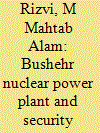

|
|
|
| 4 |
ID:
125468


|
|
|
|
|
| Publication |
2013.
|
| Summary/Abstract |
The attitude of local communities near a nuclear power plant (NPP) is a key factor in nuclear policy decision making in Japan. This case study compared local citizens' attitudes in 2010 and 2011 toward the benefits and drawbacks of hosting Kashiwazaki-Kariwa NPP. The Fukushima accident occurred in this period. After the accident, benefit recognition of utility bill refunds clearly declined, while that of public facilities did not, suggesting the influence of a bribery effect. The negative shift of attitudes about hosting the NPP after the accident was more modest in Kariwa Village, which saw a large expansion of social welfare programs, than in the other two areas, which lacked such a budget expansion. Policy implications of these results regarding the provision of economic incentives in NPP host areas after the Fukushima accident were discussed.
|
|
|
|
|
|
|
|
|
|
|
|
|
|
|
|
| 5 |
ID:
072656
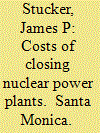

|
|
|
|
|
| Publication |
Santa Monica, Rand Corporation, 1985.
|
| Description |
xi, 63p.
|
|
|
|
|
|
|
|
|
|
|
|
Copies: C:1/I:0,R:0,Q:0
Circulation
| Accession# | Call# | Current Location | Status | Policy | Location |
| 025122 | 338.43621312509747277/STU 025122 | Main | On Shelf | General | |
|
|
|
|
| 6 |
ID:
132116
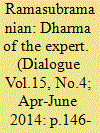

|
|
|
|
|
| Publication |
2014.
|
| Summary/Abstract |
The advent and domination of modern technology today extends from our daily domestic use all the way to national defence and international communications.
However, whenever the questions are posed about the modern technology such as the nuclear power plant in Koodankulam or the introduction of genetically modified crops, we find that even the best among us don't have a framework or approach that is clear and easy to understand. Question such as: what is the limit to the usage of modern technology? How do we measure its benefits as against its harms? And more importantly, when to reject modern technology? Are not always eliciting a clear response from intellectuals, leaders and even scientist and technocrats. We find that they are unable to balance their professional interest against the common interest for humanity.
|
|
|
|
|
|
|
|
|
|
|
|
|
|
|
|
| 7 |
ID:
107916
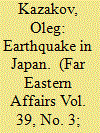

|
|
|
| 8 |
ID:
108206
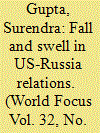

|
|
|
| 9 |
ID:
112056
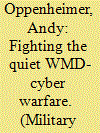

|
|
|
| 10 |
ID:
107869
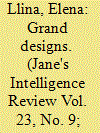

|
|
|
| 11 |
ID:
132767
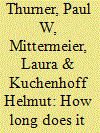

|
|
|
|
|
| Publication |
2014.
|
| Summary/Abstract |
Governments deciding to use nuclear energy as part of their country×s energy mix are faced with long-term planning efforts and huge investments. As nuclear power plants constitute one of the socially and politically most contested technologies, the question arises, which time horizons companies as well as politicians have to consider for the accomplishment and grid-connection of individual and whole fleets of reactors. Unfortunately, there are no large-N studies investigating the time for completion of such large-scale projects. For the first time, we statistically explain the duration of the construction of all initiated nuclear plant projects so far. Based on the International Atomic Energy×s comprehensive Power Reactor Information System (PRIS) we assess the impact of demographic, economic, and political preconditions of a country, at the same time accounting for different types of reactor technologies. To account for non-linear relationships, we apply non-parametric survival models with P-splines. A main result of our analysis is that time of connection to grid increases over the years indicating increased societal sensibilities, respect for higher security standards, and increased project complexities. The Harrisburg and the Chernobyl disaster did not induce a separate additional delaying effect.
|
|
|
|
|
|
|
|
|
|
|
|
|
|
|
|
| 12 |
ID:
124244


|
|
|
|
|
| Publication |
2013.
|
| Summary/Abstract |
This article analyzes the thermal energy options available in the country to support the expansion of Brazil's electricity grid capacity. The country's electricity mix consists primarily of renewable sources of energy and this configuration will be maintained throughout the 21st century. However, grid expansion can no longer benefit from hydroelectric power plants with large reservoirs leading to a greater participation of thermal power plants. Among the thermal sources available in the country, nuclear power has important comparative advantages. Recognizing these benefits, the Brazilian government has established that expanding electricity grid capacity will amount to up to 8000 MW through nuclear energy by 2030.
The use of nuclear technology for electricity generation has historically been a controversial issue worldwide and some countries have decided to review their nuclear programs in the aftermath of the 2011 Fukushima nuclear accident.
This article shows that increasing the participation of nuclear energy in Brazil's electricity grid will provide important benefits for the country by ensuring energy security, keeping Brazil's electricity mix as one of the cleanest in the world, securing electricity grid reliability and safety and reducing operating costs.
|
|
|
|
|
|
|
|
|
|
|
|
|
|
|
|
| 13 |
ID:
065420


|
|
|
| 14 |
ID:
137571


|
|
|
| 15 |
ID:
114440


|
|
|
|
|
| Publication |
2012.
|
| Summary/Abstract |
The first of the two 1,000 MW nuclear power plants under construction
for the last decade
1
at Kudankulam was due to become operational before
the end of this year. What it stares at instead is a delayed future after the
Tamil Nadu Cabinet passed a resolution in September 2011 to suspend
work on the nuclear reactor. Chief Minister Jayalalitha claimed to have
been compelled to do so in response to the public protests against the
nuclear plant, and she certainly had an eye on the local elections that
were due less than a month before the protests broke out.
2
|
|
|
|
|
|
|
|
|
|
|
|
|
|
|
|
| 16 |
ID:
128005


|
|
|
|
|
| Publication |
2014.
|
| Summary/Abstract |
The Belgian nuclear phase-out law imposes closing down in the 2015-2025 period seven nuclear power plants (NPPs) producing more than 50% of the domestic electricity. This creates an urgent problem in the country because of the absence of well-defined capacity-replacement plans. Though a safety-of-supply provision in the law allows for a delayed phase-out, hopes for a technically acceptable schedule have reduced after the Fukushima nuclear disaster in March 2011. In this article policy investigations are made with system dynamics. A significant finding from such modelling is that, in contrast to common expectations, a too early nuclear phase-out will not serve the deployment of renewable energy sources and rational use of energy. It is indeed found to primarily benefit to fossil fuel, creating unwanted drawbacks regarding safety of supply, dependency on foreign suppliers, price volatility, and increased use of non-renewable and CO2-emitting fossil fuels.
|
|
|
|
|
|
|
|
|
|
|
|
|
|
|
|
| 17 |
ID:
032992
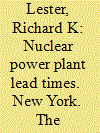

|
|
|
|
|
| Publication |
New York, The Rockefeller Foundation, 1978.
|
| Description |
41p
|
|
|
|
|
|
|
|
|
|
|
|
Copies: C:1/I:0,R:0,Q:0
Circulation
| Accession# | Call# | Current Location | Status | Policy | Location |
| 027910 | 621.483/LES 027910 | Main | On Shelf | General | |
|
|
|
|
| 18 |
ID:
096006
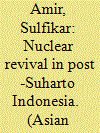

|
|
|
|
|
| Publication |
2010.
|
| Summary/Abstract |
Indonesia is planning to build a nuclear power plant to meet soaring demand for energy. Opposing this policy, an anti-nuclear alliance is emerging from grassroots groups driven by distrust of the government's ability to handle high-risk technology. This article explores the contemporary politics of Indonesia's nuclear power program.
|
|
|
|
|
|
|
|
|
|
|
|
|
|
|
|
| 19 |
ID:
174978
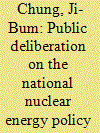

|
|
|
|
|
| Summary/Abstract |
Successful transition of a nation's energy policy requires widespread engagement from all sectors of the society, including the public. The government of the Republic of Korea conducted a deliberative polling to decide whether to resume nuclear power plant construction in response to the conflicts in the construction of the new Shin-Kori nuclear power plants in 2017. This study reports the findings of a quantitative analysis of the process and the results of the deliberation. Although the respondents supported the resumption of the construction, they favored the reduced use of nuclear power in the future. Despite the intensive deliberation process, most people did not change their initial opinions; rather, they tended to make judgments based on their values, especially their political ideologies. However, the Korean deliberation process did show signs of small success. Although the participants did not change their original opinions completely, they became more sympathetic to the opinions of the other side of the debate, suggesting the possibility of a democratic energy transition.
|
|
|
|
|
|
|
|
|
|
|
|
|
|
|
|
| 20 |
ID:
193727
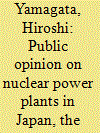

|
|
|
|
|
| Summary/Abstract |
In attempts to solve climate change and energy security issues, many countries have made plans to invest in nuclear energy. Public opinion on nuclear energy is an important factor in building support for the construction and operation of new nuclear power plants (NPPs). In this study, public opinion surveys on existing NPP use and the new construction of NPPs were conducted simultaneously using the same method in Japan, the United Kingdom, and the United States of America. Japanese respondents were neutral on existing and new NPPs, citing “no strong reason”. In all three countries, the term “new construction” made the respondents anxious about NPP safety. This study also examined whether Japanese respondents’ attitudes change when the reasons for negative opinions toward NPPs are solved. By using the phrase “NPPs that no longer require evacuation,” respondent anxiety was resolved, and an increase in the respondents who agreed with the new construction of NPPs was observed. For Japanese respondents who believed that the problem of radioactive waste had not yet been resolved, the selection of a disposal site was not perceived as a solution. Based on these findings, this research provides valuable insights that can help advance energy policy in Japan.
|
|
|
|
|
|
|
|
|
|
|
|
|
|
|
|
|
|
|
|
|